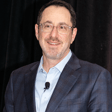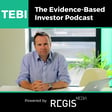Become a Creator today!Start creating today - Share your story with the world!
Start for free
00:00:00
00:00:01

Ep 32: Ten lessons the markets taught us in 2021
Transcript
Introduction and Sponsor
00:00:07
Speaker
Hello and welcome to the TEBI podcast from the Evidence-Based Investor. I'm Robin Powell and this podcast is brought to you by Regis Media, a niche provider of educational and marketing content for financial advice and planning firms.
Financial Market Lessons from 2021
00:00:25
Speaker
On this episode, we're discussing lessons the financial markets taught us in 2021.
00:00:32
Speaker
my tebby colleague Larry Suedro comes up with a list of lessons every year. Inevitably some of the lessons have featured in previous lists and yet year after year investors fail to learn them. They keep making the same mistakes. There are 10 lessons on this year's list and Larry has been talking me through them one by one. Enjoy the interview.
00:01:01
Speaker
So, Larry, thank you very much for joining me again. This list, your investment lessons the market taught us, it's become a bit of an annual thing for you, hasn't it? An annual tradition. Yeah, I've been doing it, I think, for about 15 years now, because I learned that the market does provide investors with opportunities to learn lessons, and hopefully you pay attention and what
00:01:28
Speaker
differentiates smart people from fools is smart people still make mistakes, but they learn from their mistakes and they don't repeat them. Repeating the same behavior over and over again and expecting a different outcome is unfortunately, you know, what Einstein called the definition of insanity. Absolutely right.
00:01:53
Speaker
Well, let's rattle through these. There are 10 of them. See the first on your list.
Timing Markets and Predictions
00:02:00
Speaker
Valuations cannot be used to time markets. So explain that. Yeah, what we often hear from stock market gurus is prices are exceptionally high and they generally mean PE ratios much higher than historical averages.
00:02:21
Speaker
And therefore, you want to get out of the market. A great example is a highly regarded investor, Jeremy Grantham, who's the chief investment officer of GMO. He's actually been predicting a crash of 60% to 70%, as far back as 2013, because the Schiller, Cape 10, or the cyclically adjusted
00:02:46
Speaker
P ratio was well above its average. And obviously, he's been wrong for eight years and he keeps saying them the same tune. He actually said in 2021 that the market would see a crash and when the decline comes, it will be perhaps bigger and better than anything in history.
00:03:07
Speaker
He may have made that statement because we started the year with the Cape 10 at 34, which is twice the historical average. It ended the year even higher. Today, we're right around 40. But what Grantham is missing is that the evidence shows you cannot use it to time markets. The PE ratio has virtually no predictive value
00:03:34
Speaker
for the next year or maybe even two or three years, it does have value longer term at 10 year horizons. But even there, Robin, investors have to learn. All it means is the following. A high PE ratio predicts the likelihood of lower returns.
00:03:56
Speaker
So the way we think about it is a PE of say 40, we invert that and get an earnings yield that would then predict a two and a half percent real return to the market. But you have to understand that there's still a very large dispersion of outcomes.
00:04:16
Speaker
History shows it could beat that by at least 4% or more over the next 10 years or underperform it by at least 4% over the next 10 years because people's perceptions of risk change and market sentiments changes. So you have to be prepared for a wide.
00:04:36
Speaker
potential dispersion of outcomes. You cannot use high valuations to predict bear markets and try to jump in and out. And that's what the evidence shows very clearly. People who have tried have generally been unsuccessful, even before taxes.
00:04:54
Speaker
And of course, it's not just Jeremy Grantham, Larry, is it, who's been calling the top of the market for a long, long time. Goodness me, if you'd taken his advice in 2013, you'd be feeling very, very, very sorry for yourself. Yeah, Jonathan Husman is another well-known name who's been singing from the same hymnal.
00:05:18
Speaker
And the worrying thing is sooner or later, these people are going to be right. And what we have to make sure is that we remind people that they have been calling it wrong all these years. I mean, if you call the top of the market long enough and often enough, one day you're going to be right.
00:05:38
Speaker
Yeah, Peter Lynch, I think, was the one who said, more money has been lost anticipating bear markets than ever lost in bear markets.
Challenges of Active Management
00:05:49
Speaker
Well, lesson two, Larry, is a familiar one to readers of The Evidence-Based Investor and, of course, all your books. Active management is a loser's game.
00:06:02
Speaker
Yeah, so what we mean is by that, it doesn't mean, of course, the people who are playing it are losers. It's the game that's a loser's game, which also doesn't mean it's not possible to win. It's just that the odds of doing so are so poor that it's simply not prudent to try.
00:06:22
Speaker
unless you attach a lot of entertainment value to it. It's just like going to say the blackjack tables or the roulette wheel or the slot machines. You can get rich even doing them, but not many people can succeed. So you're better off not playing.
00:06:43
Speaker
And 2021 was just another year that demonstrates this point. The S&P was up 28% and it outperformed the vast majority, 76% of all funds in its Morningstar category. And that's even before taxes. And small stocks, where you hear this argument, small cap stocks are less efficient. We had very similar results.
00:07:11
Speaker
But here's the thing, you always get every year, Robin. I literally have never heard a Wall Street guru say, this is the year you should be a passive investor. It's every single year, literally. This will be the year of active management. Then you hear one excuse after the other. Recently I heard, well, correlations, you know, are a problem. So active did poorly. Well, that's,
00:07:38
Speaker
easily exposed as a lie because while the market was up 29%, roughly, the 10 best-returning stocks returned at least 118, and the worst-performing stocks, 10 stocks, lost at least 22.
00:07:56
Speaker
Which means all you had to do was overweight those top 10, underweight the worst performer, those dogs, and you would have easily outperformed. And yet, 24% and that was it, did manage to beat the index.
00:08:12
Speaker
Finally, what we know is that percentage is pretty typical for one year, but the longer the horizon you look at, the worse the data gets. So SPIVA shows roughly that 90% plus in almost every asset class of active managers lose at the 10-year horizon.
00:08:33
Speaker
I don't know, Larry, it might just be me, but I think I've seen slightly fewer articles along the lines of this is the year for active management. I don't know. Maybe they finally learned their lesson. I'm going to disagree. In the last few days, I've been watching Bloomberg News and every one of the analysts who came on
00:08:55
Speaker
For whether it was for Morgan Stanley or JP Morgan, literally the words, this is the year you're going to have to be an active investor. Right. Okay. Moving on. Lesson three.
Investment Misconceptions
00:09:08
Speaker
Don't make the mistake of recency. Last year's winners are just as likely to be this year's dogs.
00:09:17
Speaker
Yeah, this is the very typical era, probably one of the worst and most common one by investors. They lack Warren Buffett's discipline. He's a value investor. He stays the course. Value has underperformed for long periods of time.
00:09:36
Speaker
four or five years in the late 90s and then more recently and you know from 2017 through 2020 and he doesn't care because he has a belief and a disciplined approach. Most investors unfortunately think that
00:09:54
Speaker
let alone one year, but three years is like an infinite amount of time to wait to get their returns. And so they jumped from one to the other. The best example of that most recently is Cathie Wood's Art Fund. It turned in a spectacular performance in 2020. It was up like 150% or so. Cash came piling in billions
00:10:19
Speaker
of dollars came flooding in. And by the fund, which just a few years ago, it had only $200 million, was sitting at $28 billion by the end of February. And the fund proceeded to lose about 37% from its high in mid-February to the end of the year.
00:10:39
Speaker
was down almost I think another 10% or something like that to start this year and you know investors get slaughtered and so what we show here in my lessons learned piece is we look at 11 major asset classes
00:11:00
Speaker
large small value in growth in the U.S. plus real estate and commodities, and large small value in growth and emerging markets for the international side. And we see that the top performing asset class in 2020, which was U.S. small cap stocks, dropped to number six. And the worst performer, which was REITs,
00:11:25
Speaker
in 2020 became the single best performer, returning 46% in 2021. So if you're chasing performance, you're always buying high after a great performance, selling low after poor performance,
00:11:43
Speaker
Tending to miss those rebounds and what the data shows quite often is and Peter Lynch actually looked at this himself He found in a period where his Magellan fund actually did pretty well the average investor lost money Because they poured money in after a great year. He had a poor year They pulled the money out and then weren't there when he recovered
00:12:08
Speaker
Well, you were making exactly the same point the other day about Cathie Wood, that when she really was producing stellar performance, the assets were relatively modest, and it was when she'd produced this extraordinary performance. I mean, pretty good in 2017 and very good, of course, in 2020. Everyone piles in just in time for mean reversion.
00:12:36
Speaker
Yeah, and now they're scrambling out. Yeah, well, exactly. And Larry, it's not just every year this happens, it's every country. I mean, here in the UK, we've got an active management firm, Bailey Gifford, who, you know, I have to say, I think are pretty good as active managers go.
00:12:57
Speaker
They're reasonably cost efficient, if you like. They invest for the long term. They don't overtrade, if you like. They had an amazing, particularly their North American fund, an amazing 2020 and a pretty, well, pretty dismal 2021. So again, example there of people getting in at just the wrong time. Lesson four.
Gold and Cryptocurrency Critique
00:13:25
Speaker
Gold is not an inflation hedge over your investment horizon. Tell me about that.
00:13:35
Speaker
Yeah, so gold actually is a good inflation hedge if your horizon is, let's say, a century or more. There's an interesting study that showed that an ounce of gold when Jesus walked the earth bought a good suit of clothes for the typical Roman centurion. And I would say an ounce of gold today buys a nice suit for the typical Wall Street investment banker.
00:14:04
Speaker
So you got over 2,000 years and zero return, but it did hedge inflation. But there are many periods where gold has unbelievably underperformed inflation. For example, from its peak in around 1980 to around 2002 or so,
00:14:28
Speaker
Gold fell dramatically while inflation was running about 4%. So over that 23 year or so year period, gold lost about 86% of its value in real terms. So I don't know how anyone can claim gold could be an inflation hedge when you lose 85% or so of your value in real terms over a 22 year period. And last year just provided another good example.
00:14:56
Speaker
Inflation spiked to 7% and gold fell close to 4% for the year. So it underperformed inflation by about 11%. That cannot be an inflation hedge.
00:15:10
Speaker
Right. Okay. And what about cryptocurrency? Is that an inflation hedge? Cryptocurrency to me is a pure speculation. There is no investment logic behind it. It doesn't mean it can't turn out to be worth a million dollars. If everyone believes it's worth it, then that's what it is.
00:15:32
Speaker
No different than say a Mona Lisa painting. It's what people are willing to pay for it. But there's no cash flow. And in my opinion, there's no logic because they're an infinite supply of crypto currencies. And anything that has an infinite supply should have a price that asymptotically approaches zero.
00:15:51
Speaker
That's my logic, so I don't think it's an investment. It's a pure speculation, and I'm perfectly willing to admit it could turn out to be a very good one. But it certainly is an inflation hedge. You can't drop 40%, which it has done over the last few months, when inflation is spiking and call it an inflation edge. It's just a speculation, nothing more.
00:16:15
Speaker
Lesson five, the investment world isn't flat and the diversification of risky assets is as important as ever.
00:16:26
Speaker
Yeah, so here we had Thomas Friedman's famous book, I thought the world was flat and interconnected in much better ways. And therefore, we'd see very similar returns around the globe as global trade increased and we became more of a one world.
00:16:46
Speaker
So people said you don't need international diversification. You don't have to worry about those kinds of issues because everything should have similar returns. And as we show in my table with the article posted on your website, that simply has not been the case. Anyone looking at the data can see that there are still unbelievably large
00:17:11
Speaker
differences in returns between the US and international stocks over the last 20 years after Friedman's book came out. For some long periods, international outperforms. In some long periods, the US has outperformed, which has been in the case recently.
00:17:31
Speaker
But in only three of the 21 years that I looked at, the difference of returns between the S&P and the EFI index was less than 5%. And there were 14 years when it was at least 8%. Clearly, the world isn't flat. Why dispersion of returns means that there are plenty of opportunities for diversification to be helpful.
00:18:00
Speaker
Notwithstanding what you were saying earlier, Larry, about value not necessarily being a predictor or valuations, not necessarily being a way to time markets, if you like. What about US valuations at the moment? I mean, a lot of people tell me that the US is overpriced, the rest of the world is fine. What do you make of that argument?
00:18:30
Speaker
Well, anyone who says the US is overpriced is saying all the sophisticated investors, institutions who do 90% of the trading, therefore setting prices are just a bunch of dummies. That's basically, I'm exaggerating the point, but to make the point, but high valuations, it does not mean in general, I will say, with one exception, if you want to get into, I'll do that.
00:18:58
Speaker
But high valuations do not mean over-valuations. When Jeremy Grantham made his forecast, then I wrote a paper for advisor prospectus explaining why I thought he was dead wrong. We don't have time to go into all the reasons, but high valuations simply predict low future returns, not a bear market, not that prices are overvalued.
00:19:24
Speaker
It could mean that people have a perception that stocks are just a very good investment with less or low risk and are worthy of paying higher prices for it. So today what we have for the S&P 500
00:19:40
Speaker
is a Cape 10 of about 40, so that would predict a real return over the next 10 years as the mean of a wide dispersion again, but of two and a half percent
00:19:56
Speaker
Now, that's a real return. The riskless instrument over that period is a 10-year tips, no inflation risk. That has a real yield of less than a round. Let's just round it to minus 1%. So you've got an equity risk premium, then a 3.5%.
00:20:15
Speaker
That is certainly low, less than half of the historical average, but it doesn't tell us that the market's overvalued, just that it's highly valued. There is no long-term mean that something should logically revert to, and there are many good reasons why I could argue why PEs today should be much higher than they were over the 150 years roughly of data we have for the Cape 10.
00:20:43
Speaker
International valuations, however, are much lower simply because international stocks and emerging stocks have underperformed for the last decade. Their CAPE 10 for the E-fee is about half of the U.S. and E-fee is even, sorry, emerging markets are even lower. So you have higher expected returns there. But that doesn't mean they're better investments. It means the market believes they're riskier, which means higher expected returns.
00:21:13
Speaker
Okay, that was lesson 5. We're halfway through your list of 10, so let's take a short break there. You're listening to me, Robin Powell, interviewing Larry Suedrow on the Tebbe podcast, brought to you by Regis Media. Now, if you're new to investing, there's a book that I've just written with fellow financial blogger Ben Carlson that you really ought to read. It's called
00:21:38
Speaker
Invest Your Way to Financial Freedom and it's published by Harriman House. Mainly written for a UK audience, the book has no hidden sales agenda and is based on peer-reviewed academic evidence.
Book Promotion and Hedge Fund Criticism
00:21:54
Speaker
It explains in simple terms how young investors can develop good habits, save a fortune in unnecessary fees and achieve financial freedom many years earlier than they otherwise would.
00:22:08
Speaker
You can either buy the book direct from the publisher or via Amazon. The book is in paperback and there are Kindle and Audible versions too. That's Invest Your Way to Financial Freedom by Ben Carlson and me, Robin Powell. OK, welcome back. I'm talking to Larry Zwedro about investment lessons the market taught us in 2021.
00:22:38
Speaker
Right, Larry, we've done the first five, lesson six. Hedge funds are not investment vehicles. They are compensation schemes. Wow. You're really telling it like it is.
00:22:52
Speaker
Yeah, that's not my line. That's a Rex Sinfeld, one of the founders of dimensional fund advisors or gene farmers. I can't remember which of the two, but it's a great line and reflective of the truth. Hedge funds entered the year coming off the 12 straight year of trailing stocks as measured by the S&P 500. And now that may not be a fair measure in the sense that hedge funds
00:23:21
Speaker
It can be long short. They also invest in bonds and other things. So we look at other metrics. But in 2021, the HFRX Global Hedge Fund Investable Index returned 3.7%, which meant out of all the major equity asset classes, it only outperformed emerging markets.
00:23:43
Speaker
It did, of course, outperform safe bonds, which had negative returns. But if you look at a typical 60-40 portfolio, it probably would have returned something like 19%, depending on how much you had in international and US.
00:24:01
Speaker
and how much in value, etc. I wrote up the piece on your website showing how I calculated it, but investors could create their own calculation. So they would have underperformed a typical 60-40 portfolio
00:24:20
Speaker
Sorry, an all-equity portfolio that was diversified globally by about 15 percent. And if you took the 60-40 portfolio using, say, five-year treasuries, you would have got 11, so you would have underperformed by about 7 percent.
00:24:38
Speaker
That's really bad in a period where you obviously had great opportunities to add value as there were some assets like commodities and real estate that performed spectacularly. So then what we did is can look at the longer term evidence, Robin. Over 20 years, that HFRX Global Hedge Fund Investable Index returned just 2.2
00:25:05
Speaker
percent, it underperformed every equity asset class and it even underperformed by almost two percent five-year treasuries and by almost five percent longer term treasuries. This lesson that hedge funds should generally be avoided is one the market teaches every year. Just if I can play devil's advocate, Larry, and you know, I agree with everything you've said about hedge funds, but
00:25:32
Speaker
If there were a hedge fund manager sitting in on this conversation, I'm sure they would say, yeah, well, the market's been going up since 2011 or whatever it is. One of these days, there will be a very steep correction or a crash, and that's when hedge funds will come into their own. Well, we had that crash in 2020.
00:25:55
Speaker
We had it in 2002 and you see the long-term data and the evidence is investors got slaughtered while the hedge fund sponsors got fat. All right. Okay. You don't mince your words, Larry. Thank you. Lesson seven, the correlation of returns of stocks and bonds is time varying. Right. Explain that.
Market Correlations and Political Influence
00:26:25
Speaker
Yes, so correlations tell you the relationship between returns. And many people think of safe bonds as being negatively correlated with stocks. So when stocks go down, the bonds will be their safe haven.
00:26:45
Speaker
And that of course does happen when especially we get flights to quality from crisis like the pandemic and also in 2008. However,
00:27:00
Speaker
Correlations are time varying and very dependent upon regimes. So what you have to be aware of is that those correlations can change. And we have had, I think, five periods where stocks went down and bonds went down. And that could be really bad if you're on longer term bonds, because instead of
00:27:26
Speaker
dampening the volatility of the portfolio, it's still dragging the returns down. And that's a real risk we saw coming up now. 2021, stocks gave you great returns, so a 60-40 portfolio did well.
00:27:47
Speaker
But it showed that that relationship can be time varying. We also have periods where stocks go up and bonds go up. We saw that for most of the last decade because lower bond yields, higher prices support higher equity valuations.
00:28:05
Speaker
But now the lesson really should be taken. We can see both stocks and bonds go down as we did in the 70s. If bonds are going down, not because of real economic growth going up, driving interest rates up,
00:28:22
Speaker
from a demand side, but because of inflation, we get that inflation risk, bonds get hit, stocks could get hit as the Fed tightens, and now you get both of them underperforming at the same time. Investors have to be aware that that correlation is time varying and they need to understand what risks they are facing and how that can affect their portfolio and take that into account as they design their portfolio.
00:28:52
Speaker
Okay, lesson eight, don't let your political views influence your investment decisions. And of course, the election of course was the end of 2020 in the US, but this was Biden's first year 2021 in office. So explain that rule and why the event market events of last year bore that lesson out.
00:29:19
Speaker
Yeah, so one of my most important roles as our chief research officer at Buckingham Wealth Partners is helping prevent investors from committing what I refer to as portfolio suicide, which is panic selling resulting from fear, whatever the sauce. And sometimes it's a crisis like COVID or oil embargo or a war.
00:29:44
Speaker
or sometimes it's a crisis of confidence in the political situation. What the academic research is very clear is that
00:29:56
Speaker
When your party that you favor is in power, you tend to be more confident if a problem in the economy or markets arises, that party will figure it out, how to address it, turn it around quickly, and you tend therefore to not trade, have confidence, you don't panic and sell.
00:30:19
Speaker
And when the party you favor is out of power, the reverse is true. You don't have confidence, they'll resolve the problem. And now you start to panic, trade actively, and we know that the more people trade, the worse their results. So the best example is this.
00:30:38
Speaker
In 2000, George Bush is president. We get 9-1-1 in the bear market. Republican investors earn higher returns than the Democrats simply because their political views enabled them to have more confidence that it would be resolved successfully, whatever steps the government would take to resolve the problem. Democrats did worse.
00:31:03
Speaker
And every call literally that I got from clients worrying about the markets were from Democrats. And that's like 98%. That was just anecdotal. I'm just one advisor. But when Obama became president, we had the great financial crisis. The same thing happened in reverse. I got almost no calls from Democrats worried that this thing couldn't be turned around. They were all from Republicans.
00:31:32
Speaker
And now they were the ones who suffered. We had a bunch of people I couldn't talk off the ledge. And they sold in a panic. And it's very difficult to get back in because it never looked safe. And again, in 2020, when Trump lost, the Republicans now have to face their demons. It's a disaster. We got COVID and Biden's president. And of course, the stock market soared. And many investors who panicked and sold
00:32:00
Speaker
Of course, missed out on great returns. The lesson is simple. Whatever you know about the market, it's already in prices. And it's best simply to avoid letting your political biases impact your decisions. Warren Buffett certainly doesn't let his political views impact his investment decisions. And you shouldn't either.
00:32:26
Speaker
I think in a sense that lesson is possibly more relevant to the US than it is here. There is a sense too that the stock market and business and the economy and so on generate. I'm not making a political point here at all. Those things tend to do better under the Conservatives and I think there's the same feeling in America that
00:32:52
Speaker
the economy and the markets do better under the Republicans. But I remember Tim Edwards from S&P Dow Jones telling me that actually, if you look at the data, stock markets have narrowly, and I think it's just very narrowly, done better under the Democrats than under the...
00:33:12
Speaker
I wouldn't attach any significance to that data. So as a good example, we had the financial crisis in 08, which turned around in 09. I wouldn't blame that financial crisis on George Bush. It was caused by other problems. And Obama got the benefit of great stock returns.
00:33:38
Speaker
which he had really nothing to do with. I don't think it would have recovered whether we had Democrats or Republicans. So a matter of timing, if you will, we would have had a great depression whether Herbert Hoover was president or Roosevelt was president. Roosevelt benefited from the ultimate recovery, but it would have happened whether he was president likely or not. So I just think there's just,
00:34:06
Speaker
Even if there was a relationship, there's no causation there. So I wouldn't use it as a predictor. Larry, my fault. We're digressing. So on to lesson nine.
Diversification and Investment Myths
00:34:17
Speaker
Diversification is always working. Sometimes you like the results and sometimes you don't. That's very well put.
00:34:27
Speaker
Yeah, so what we mean is we diversify, of course, unique sources of risk because we don't want to put all our eggs in one basket. And we know there are no gurus out there who can help you tie markets effectively, jumping from one asset class to another or US international. If there was, we'd see active managers persistently outperforming and we don't have evidence of that. So you diversify because you acknowledge you don't have a clear crystal ball.
00:34:57
Speaker
And once you diversify away, at least for US investors, it would be diversifying away from the index that's reported every day, the S&P 500, then you have to acknowledge you're not going to look at like the market, whether you add more value stocks or small caps or real estate, commodities, emerging markets, international, whatever it might be. But you shouldn't care.
00:35:23
Speaker
Because you bought, if you will, portfolio insurance that would protect you if that one index did poorly, which the S&P has had a great run for the last 10 years, but it's also had some very long periods.
00:35:40
Speaker
where it has dramatically underperformed, you would have been better off in other asset classes. 2000 through 07 or 08 was a great example where international did better, emerging markets did better, value did better.
00:35:56
Speaker
you just have to live with that what's called tracking error or tracking variance and not pay attention to it because if you do you're going to be subject to that recency bias and you'll end up buying high after good returns and selling low instead of doing what smart investors do which is to rebalance which means you sell after
00:36:20
Speaker
high returns, taking some of those chips off the table, and you buy what is done poorly now when their valuations are relatively lower and expected returns are higher. So as a diversified investor, you're always going to be missing out on something, basically, aren't you? But what you've got is the insurance that if the worst happens, you're not going to lose everything.
00:36:49
Speaker
Yeah, you have a much more smooth ride and compound returns matter. And the object is not to end up with the most amount of money. The object is to give yourself the best chance of achieving your financial goals and a diversified portfolio.
00:37:07
Speaker
clearly gives you a much better chance of doing so, which is why economists have always said diversification is the only free lunch in investing because done properly you reduce your risk without reducing your expected returns. And the final lesson, lesson 10, the strategy to sell in May and go away is a myth.
00:37:34
Speaker
Now this one I have to deal with every May on CNBC has somebody pointing this out. Now there is some kind of logic if you will to people believing why it's true because stocks have tended in the U.S. to do much better
00:37:53
Speaker
in the November through April period, getting a risk premium of about 6% a year, where they only get less than half of that May through October. But still, they earned about two and a half percent a year more from May through October than T-bills. So getting out of the market, you know, from May through October hurts you.
00:38:19
Speaker
And that's what the evidence says. And the last year that selling in May would have helped you even before considering taxes was 2011. Every year since then you would have been better off being in the market the entire time. It simply is a myth.
00:38:40
Speaker
There's no logic behind it either.
00:38:56
Speaker
You know, every October, almost without fail, you see an article about, you know, October is a kind of dodgy month for the equity markets and so on. And goodness me, that was nearly nearly 100 years ago, and we're still talking about it.
00:39:11
Speaker
Yeah, you get these coincidences, you have very few big crashes. And if, you know, a couple of them happened the same September, October period, so we had 911 in the Great Depression, and the beginning of the Great Financial Crisis happened around the same time. Those are three events out of 100 years, they could have happened at any point in time. There was no reason they actually happened in September.
00:39:39
Speaker
Larry, this has been a really interesting discussion. If anyone wants to catch up on these investment lessons of Larry's there on the evidence-based investor, we're running them in two parts. Larry, before we go, is there a lesson that you can leave us all with as we
00:39:55
Speaker
Head into 2022. I would say this the overriding lesson is this all crystal balls are cloudy and the best an investor can do is to develop a well thought out plan that globally diversifies across lots of unique sources of risk not putting their eggs in one basket.
00:40:15
Speaker
Making sure they don't take more risks than they have the ability, willingness, or need to take. Because once you've won the game, you should pretty much stop playing and don't risk your fortune. And then simply stick with your plan unless any of your underlying assumptions have changed.
00:40:35
Speaker
Like you've got an inheritance, now your need to take risk is lower, so you should likely reduce your risk. You have a divorce or a death in the family. On the other side, that could cause you to have less of an ability to take risk, so you should lower your equity allocation regardless of what's happened in the market.
00:40:55
Speaker
But other than that, the best thing investors could do is to have a well-thought-out plan and then act like the lowly postage stamp, which does one thing and only one thing, but it does it exceedingly well. It sticks to the envelope until it reaches its destination. And that's what investors should do. Stick to their plan, rebalance in tax management, and adjust only when your assumptions have changed.
00:41:23
Speaker
and then focus on the big rocks in your life and you won't have to watch CNBC or read barons because you won't learn anything from them.
00:41:35
Speaker
I don't know about you, but I love that postage stamp analogy. You've been listening to me, Robin Powell, interviewing Larry Suedro on the Tebbe podcast, which is produced and funded by Regis Media. If you're a financial advisor and would like to know more about Regis Media, just visit our website, RegisMedia.com. That's RegisMedia.com.
00:42:03
Speaker
If you've enjoyed this podcast, please subscribe to it on iTunes or on SoundCloud. Better still, why not write a review? Thank you to Larry Suedro, and most of all, thanks to you for listening. Until next time, goodbye.
















